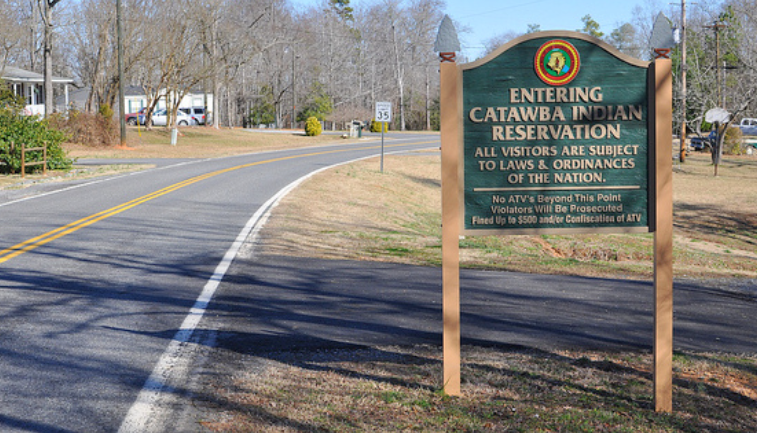By: Skylar Laird SC Daily Gazette
COLUMBIA — As the Catawba Nation tries to double its police force, a bill adding the Native American tribe’s dedicated officers to the state police retirement system could help, officials for the tribe have said.
The bill, which passed the Senate unanimously but is awaiting a hearing in the House, would allow members of the police department to receive monthly pension payments after their retirement, based on their salary and years of service. All cities and counties in the state are allowed to opt into the system.
The Catawba Nation, which established its police department in 2023, has struggled to hire officers in large part because nearby law enforcement agencies, such as the York County Sheriff’s Department, offer better benefits, said Sen. Michael Johnson, the bill’s sponsor.
“They’re just simply asking to be allowed to join in so they can attract and, most importantly, retain law enforcement,” Johnson, R-Tega Cay, told a panel of senators.
Ideally, the department would have between 12 and 15 police officers, said Shawn Butler, head of public safety and chief of police for the tribe. The tribe hired its sixth officer earlier this month, but he still needs to go through training before he can officially start policing the reservation’s 4,200 people.
Allowing the Catawba Nation’s officers to join the state retirement system “is not only a matter of fairness but also a practical step toward strengthening law enforcement and public safety statewide,” Butler said in a statement.
“Ensuring equitable benefits for (Catawba Nation Tribal Police Department) officers will enhance recruitment, retention, morale, and inter-agency collaboration — all of which are essential for building safer and stronger communities,” Butler said.
In the past, the York County Sheriff’s Department handled any issues on the reservation. The state’s only federally recognized tribe still has an agreement with the sheriff’s department to help out as needed, though the goal is to become independent, said the tribe’s lobbyist, Jason Puhlasky.
If allowed to join the retirement system, Catawba Nation officers would contribute nearly 10% of their total pay, the same as every other police officer firefighter, and magistrate who participates. The retirement system allows retirees to start receiving benefits after working for 27 years or turning 55, so long as they meet the program’s requirements.
Because the nation’s police force is so small, the impact on the retirement system will be minimal, according to a fiscal analysis of the bill.
“It would be like any other small town joining,” said Justin Werner, an attorney for the Public Employee Benefit Authority, which oversees retirement plans for the state.
Unlike other towns, cities and counties, the Catawba Nation would need legislative approval to join because of the tribe’s status as a sovereign nation.
Since 1993, the tribe has governed itself under an agreement with the state and federal governments. In joining the retirement system, the nation would have to follow the rules of the state retirement system or face enforcement actions.
Giving up any aspect of the tribe’s hard-won sovereignty is difficult, but tribe leaders felt it was worth the benefit of hiring more officers, Puhlasky said.
The agreement is “a huge give, just so you know,” Puhlasky told legislators. “It comes with great trepidation.”
The same settlement that secured the tribe’s federal recognition as a sovereign nation also gave it the power to create its own police department, though for years it lacked the resources. After the tribe’s Two Kings Casino opened in Kings Mountain, North Carolina, in 2021 — roughly 50 miles from the reservation — the revenue allowed the tribe to start hiring more officers.
Those officers, who work and live in South Carolina, won’t be involved with the casino over state lines, Puhlasky said. Security at the casino is handled through an agreement with the local sheriff’s department that allows the tribe to hire local deputies as security during their off-duty hours, he said.
As the police department grows, the tribe plans to build a permanent courtroom and police department, to be called the Catawba Nation Tribal Court and Peacemaking Center, on the reservation.
Early estimates put the cost of the roughly 12,000-square-foot building between $10 million and $12 million, Butler said. A Department of Justice grant will cover $1.6 million of that. But before the tribe can finish its own public safety center, it needs to know it can hire the officers to staff it, Puhlasky said.
“This is a big piece of how that would work,” Puhlasky said.










